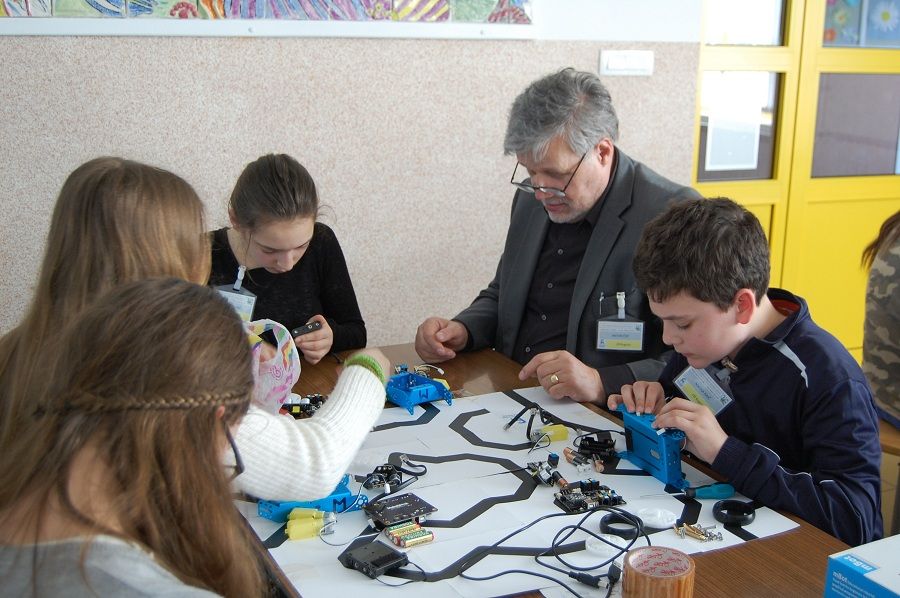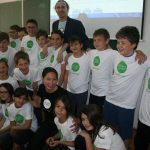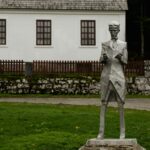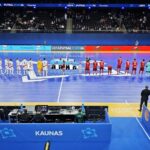The event was attended by President Kolinda Grabar Kitarović and Education and Science Minister Blaženka Divjak.
An award ceremony for participants and winners of the Croatian Makers League was held on Tuesday at the Museum of Contemporary Art in Zagreb. The event was attended by President Kolinda Grabar Kitarović and Education and Science Minister Blaženka Divjak, as well as numerous participants of this important project.
The Croatian Makers League is part of the Croatian Makers project, launched in 2014 by the privately-funded Institute for Youth Development and Innovativity (IRIM), founded and financed by Nenad and Rujana Bakić. The League provides for a broad and systemic inclusion of robotics, automation and programming in elementary school education. This year, the project brought together around 8,000 children from 360 institutions, out of which 300 were primary schools, and the rest were children’s associations and libraries. Since the beginning of the programme, these organizations have received about 1,800 educational robots, mainly from the IRIM, but also with the help from other institutions and individuals. For all interested teachers and mentors working with children, free education and support are provided, and participation is contracted with their institutions.
Nenad Bakić, the founder of the IRIM, noted that during the five rounds of the League, with an average of 1,500 children attending, about 30 percent of students were girls, which is significantly greater share than usual in similar activities. “The main idea is inclusion, locality and regularity so that as many children as possible can participate equally in advanced activities that fit into existing curricula. The League relies on the motivation and enthusiasm of teachers who voluntarily approach us. They take the equipment and activities that we offer and fit them into existing educational curricula and additional activities and in that way demonstrate that there is an enormous human capital in the education system that can provide more to children within the framework of the existing curriculum, in order to help them become citizens of the 21st century.”

The competition is divided into two categories: 1st to 5th grade, and 6th to 8th grade. There are 64 winners in 32 regions in which the league was run. Tasks in which individual and group competitions took place included tracking a line, avoiding obstacles and combining with other technologies (micro bit). The platform used is the most up-to-date educational mBot robot, that offers a straightforward entry into the world of robotics, but also allows for a more advanced use.
“When we first launched the League just 15 months ago, we wanted to include 30 schools experimentally and donate 200 robots. However, the high level of interest led the league to its present size, but we plan to continue to expand. The significant success of this initiative in the Croatian education system confirms that a quick and fruitful transformation is possible in both education and other segments of society,” added Bakić.
British Ambassador to Croatia Andrew Dalgleish expressed his satisfaction with participating in this project almost from the very beginning. “One of the first things I did when I came to Croatia and started my term was to accept the offer of Croatian Makers to go to Slavonski Brod and learn how to program with children. This project is for me the greatest proof that Croatia and the United Kingdom can successfully cooperate and share their valuable experiences.”
The STEM education and robotics are far more than algorithms, maths and technology. It is a particular way of thinking and encouraging creativity, which is supported by Education and Science Minister Blaženka Divjak as well. “What is important is the idea that young people, children and students are agents of change, they are the ones where the transformation process begins. We can not wait for changes from above, but it is important to push the changes from below. However, the state needs to take its important role,” said Divjak and announced that the Ministry of Science and Education would provide 15,000 STEM scholarships in the next five years.
The competition was held under the auspices of President Kolinda Grabar Kitarović. “I believe there is no one here who needs to be convinced that it is important to teach children the latest trends, robotics, automatics and programming. This is all part of the STEM area which is the future and the foundation of any modern society. Therefore, I did not doubt for a moment that I should accept patronage over a project aimed at providing the ability to learn and work with advanced technologies.”
The President also pointed out that this philanthropic project was unique in scope and size, but also in its content, as well as by showing that it is possible in Croatia for people to come together when it comes to education and the future of children. Such coming together is not only welcomed but necessary. “I express my sincere gratitude to the Institute for Youth Development and Innovativity and to Mr Nenad Bakić for creating and implementing this valued project. You have provided our students with a unique opportunity to acquire the knowledge and skills they will need when they grow up. At the same time, you have given them the opportunity to better understand the world through curiosity and playfulness and to indeed grow up in the 21st century, in which advanced technologies are an indispensable element,” said the President.
The Croatian Makers Project has expanded outside Croatia as well. All the know-how, with initial financial support, was donated to Serbia and Bosnia and Herzegovina, where identical competitions took place this year. The battle for knowledge in Serbia included 400 schools with 2,000 robots. After the initial financial donation by the IRIM and other smaller donors, the project was entirely financed by the UNDP and the Serbian government. The SPARKreators league in Bosnia and Herzegovina brought together 350 schools with 700 donated robots. After IRIM’s initial financial support, it was entirely financed by SPARK.
The best and most motivated players of the League from Croatia, Serbia and Bosnia and Herzegovina have already received more advanced Abilix robots, which were fully donated by the IRIM. In September, an advanced robotics competition WER – Croatia Open will be held in Zagreb. The winning team will go to the main competition in Shanghai in November. The WER Cup was launched in China in 2000 and now has over 500,000 competitors annually in more than 30 countries. The first global competition was held in 2013.









